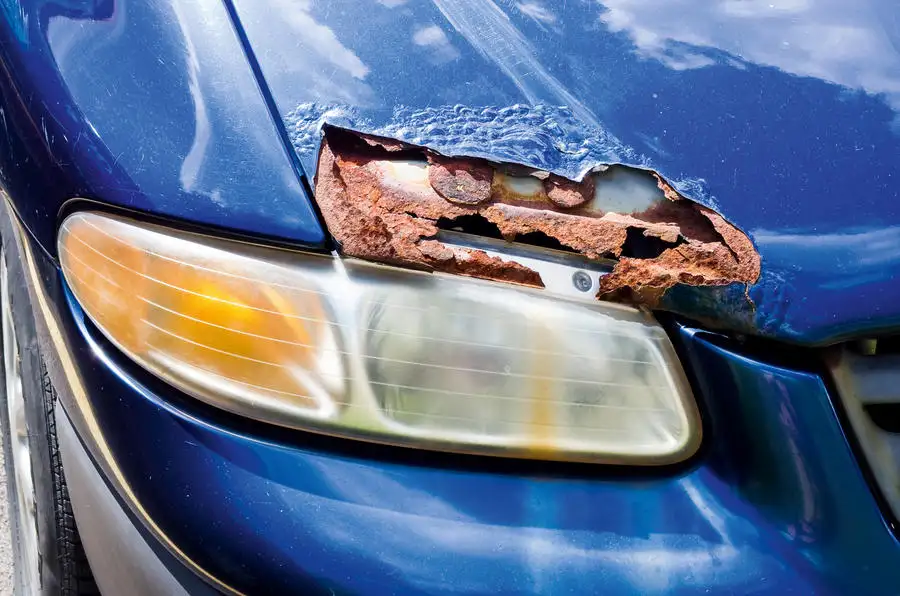The reason that Japanese cars do not rust is because they are made with a process called electrocoating. This process coats the metal of the car with a layer of paint that is electrically charged. The charge helps the paint to adhere to the metal and also makes it more resistant to corrosion.
There are a few reasons why Japanese cars don’t rust as much as other cars. One reason is that they’re often made with better materials. For example, many Japanese cars are made with galvanized steel, which is less likely to rust than regular steel.
Additionally, the paint on Japanese cars is typically of higher quality and applied more thickly, which also helps prevent rusting.
Another reason why Japanese cars don’t rust as much is that they’re simply built better overall.Japanese manufacturers have a reputation for making high-quality products, and this extends to their vehicles. In general, Japanesecars are just better constructed than other cars, which helps them resist corrosion and aging.
Of course, no car is completely immune to rusting – but Japanesecars definitely seem to fare better than most in this respect.
Stop the Rust! JDM cars are BAD!
Are Japanese Cars Prone to Rust?
While all cars are susceptible to rust, it is a particular problem for Japanese cars. This is because they are often driven in coastal areas where the salt in the air can cause corrosion. In addition, Japanese manufacturers use thinner steel panels on their cars which makes them more vulnerable to rusting.
To combat this problem, many Japanese carmakers have developed special anti-rust treatments for their vehicles. These usually involve some kind of coating or sealant that helps to protect the metal from corrosion. Some companies even offer warranties that cover rust damage.
Of course, no treatment is 100% effective and there is always the possibility that a car will develop rust spots at some point in its life. However, by taking some simple precautions and regularly inspecting your car for signs of corrosion, you can help to keep it looking its best for longer.
Why are Japanese Cars So Durable?
When it comes to car durability, Japanese cars are often considered to be some of the most reliable on the market. There are a number of reasons why these vehicles tend to last longer and perform better over time than others.
First, Japanese automakers place a great emphasis on quality control.
In order to ensure that their products meet high standards, they employ rigorous testing procedures during development and production. Additionally, they use advanced technologies and materials that help to improve durability.
Second, Japanese cars are designed with longevity in mind.
Many features and systems are built with regular maintenance and repairs in mind, which helps them last longer. For example, many Japanese engines have oil-cooling systems that prevent overheating and wear-and-tear.
Finally, Japanese manufacturers offer extensive warranties on their cars.
This shows a commitment to standing behind their products and ensuring customer satisfaction. In fact, many dealerships offer free or discounted maintenance services for customers who purchase new cars from them.
All of these factors combine to make Japanese cars some of the most durable on the road.
If you’re looking for a vehicle that will hold up over time, you can’t go wrong with one of these brands.
What is the Most Rust Resistant Car?
There are a few different ways to measure rust resistance in cars. One way is to look at how long it takes for the metal on the car to start corroding when exposed to salt water. Another way is to look at how well the paint job protects the metal beneath it from corrosion.
Generally, Japanese and German cars are considered to be the most rust resistant. This is due in part to their use of higher quality steel and better painting processes. However, there are a number of other factors that can affect a car’s susceptibility to rust, including where it’s driven and how it’s maintained.
So, while there’s no definitive answer to which car is the most rust resistant, we can narrow it down by looking at some of the models that tend to fare better than others in this area.
Some of the most popular rust-resistant cars include the Honda Civic, Toyota Corolla, Subaru Outback, and VW Golf. These models all have one thing in common: they’re built with quality materials and receive regular maintenance (like touch-ups to their paint jobs).
Of course, even the best-built car will eventually succumb to corrosion if it’s not properly cared for. That’s why it’s important to wash your car regularly (especially in winter), wax it often, and keep an eye out for any chipped paint or bare metal spots that could be susceptible to rusting.
Why Do Cars Not Rust Anymore?
Cars do not rust anymore because of the invention of Rust-Oleum. Rust-Oleum is a paint that is applied to metal to prevent rust. It was invented in 1921 by Robert Fergusson, a Scottish chemist.

Credit: www.autocar.co.uk
Japanese Cars are Overrated
Japanese cars are overrated. I don’t care what anyone says, they just are. I mean, sure, they’re well-made and all that, but so are German cars.
And German cars don’t have half the problems that Japanese cars do.
I remember when I first started looking into buying a car. I was dead set on getting a Honda Civic because everyone told me that they were the best cars out there.
But then I did some research and found out that they actually have really high maintenance costs. And their resale value isn’t even that great! So I cross them off my list and decided to go with a German car instead.
And I’ve never looked back since. My German car has been absolutely amazing and I haven’t had any of the problems that people always complain about with Japanese cars. So if you ask me, Japanese cars are definitely overrated – save your money and get a German car instead!
Conclusion
One of the most common questions we get asked here at Japanese Motors is “Why do Japanese cars not rust?” It’s a valid question, particularly given that many other vehicles on the market are susceptible to this problem. So, why don’t Japanese cars rust as easily as their counterparts?
Well, it all comes down to the manufacturing process and the materials used. When it comes to steel, for example, Japan generally uses higher grades than what is found in other countries. This steel is then treated with a zinc coating which helps to prevent rusting.
Additionally, Japanese cars often have better undercoating and sealing which further protects against corrosion.
Of course, no car is completely immune to rusting and there are always exceptions to the rule. However, on the whole, you can expect your Japanese car to last longer and look better for longer thanks to these design and manufacturing features.
